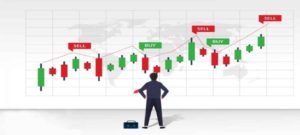Hay dos enfoques para evaluar el rendimiento de un activo. Con base en los movimientos de precios y volúmenes en el pasado, los indicadores técnicos se utilizan en el análisis técnico para predecir el rendimiento futuro. A menudo se utiliza en combinación con el estudio de datos fundamentales.
Utilizando fundamentos económicos y financieros, se puede calcular el valor intrínseco de un valor. Esto incluye desde elementos macroeconómicos como la salud de la economía y el sector hasta elementos más microeconómicos como el éxito de la gestión de la empresa. Los comerciantes pueden usar estos datos para determinar si el precio actual de un activo es exorbitante o está infravalorado.
A pesar de su aparente simplicidad, determinar el valor de un valor requiere considerar varias variables.
Las tasas de interés
Uno de los factores que afectan los precios de las acciones son las tasas de interés. El costo de pedir dinero prestado aumenta cuando aumentan las tasas de interés, lo que reduce los márgenes de beneficio de las empresas. La disminución de la rentabilidad puede conducir a una caída en el valor de las acciones. Los recortes en las tasas de interés son generalmente favorables cuando la economía está en recesión y los valores de las acciones están cayendo en picado. No todo el tiempo. El mercado de valores sufrió como resultado de la caída más reciente de la tasa de interés de la Reserva Federal, que muchos consideraron insuficiente.
Inflación
Un aumento o una caída en los precios de las acciones tiene un efecto en el mercado. Los aumentos de precios son el efecto de un entorno inflacionario. Las preocupaciones sobre el acaparamiento de efectivo corporativo se exacerban a medida que aumentan los precios. La deflación, por otro lado, es una preocupación grave. Aunque los precios más bajos proporcionan un mayor poder adquisitivo, la deflación se considera una gran señal de advertencia económica. La inflación es algo bueno, pero no debería ser demasiado bueno. La Reserva Federal utiliza las tasas de interés para controlar la inflación.
PIB
El producto interno bruto (PIB), o producto interno bruto, es un participante del mercado de valores. Los precios de las acciones suben cuando se considera que la actividad económica está mejorando como resultado de datos más altos del PIB. Cuando las personas son optimistas, gastan más dinero y compran más cosas, lo que aumenta aún más el PIB. También existe la posibilidad de que un aumento del PIB inferior al previsto sea una señal de lo que vendrá. Es posible que se desplomen tanto los precios como la confianza del consumidor. La falta de confianza en el mercado de valores puede llevar a acciones que tengan un impacto negativo en la economía.
Desempleo
El mercado de valores utiliza el desempleo como indicador rezagado. Esto a menudo se toma como una señal de que la economía está en problemas. Para cuando la tasa de desempleo caiga, es probable que la economía haya cambiado. Las acciones pueden sufrir si la tasa de desempleo es mayor que la proyectada. Cuando una persona está desempleada, significa que está buscando trabajo activamente pero no puede hacerlo. Existe una correlación directa entre el aumento del desempleo y la caída de los precios de las acciones y la confianza económica.
guerras comerciales
El 1 de agosto, los aranceles adicionales sobre China le costaron al Dow Jones más de 300 puntos, y la guerra comercial en curso le costó al Dow más de 750 puntos el 5 de agosto. El costo de hacer negocios en los Estados Unidos aumenta como resultado de las guerras comerciales y los aranceles. . Los impuestos sobre las importaciones extranjeras suelen ser más altos. Se deben tomar decisiones sobre el traspaso del costo a los clientes. El consumo y el crecimiento económico pueden verse sofocados por el alto gasto de los consumidores. Como resultado de no repercutir los gastos, las empresas sufren pérdidas financieras. Si bien las disputas comerciales tienen un impacto a corto plazo en la economía, los precios de las acciones pueden verse afectados.
Veredicto
Una evaluación exhaustiva de las existencias debe tener en cuenta varios factores más. Para elegir aquellos que funcionan bien y se ajustan a su estrategia comercial, solo necesita una comprensión básica de la misma.




